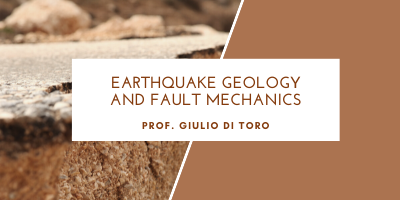Earthquake Geology and Fault Mechanics

Period: Second semester
Course unit contents: Topics:
• Stress and Strain
Deformation Processes in the Lithosphere
• Brittle fracture and friction of rocks
• Fluids, faults and earthquakes
• Faults and Structure of Fault Zones
• Fault Mechanics
• The nucleation, propagation and arrest of individual seismic ruptures
• Earthquake mechanics and the seismic cycle
• Earthquakes and Tectonics
• Earthquake forecasting and hazard
Planned learning activities and teaching methods:
This practical-based course will include 24 hours of classes (3 CFU), 24 hours of lab activities (2 CFU) and a 3-days long field trip in the Central Apennines (1 CFU). In fact, our teaching philosophy is that only with direct and practical experience the student will learn and become competent on a particular topic.
The lessons, presented using PowerPoint (all slides will be available on the University of Padua's Moodle-STEM platform), will be supported by videos and virtual activities. In addition, my teaching methods, developed over the years thanks to continuous feedback from students, will include the use of a camera and a projector with which I will draw and discuss all the drawings, graphs, equations, etc. presented in the slides. The purpose of this method is to allow a complete and detailed understanding of each topic covered in the course during class hours.
The “practical” laboratory experience will include group activities to conduct analogue experiments with the spring-slider model to simulate the seismic cycle and to interpret the mechanical data. The results of the “group” experimental activities will be presented by each student with a short talk (power point presentation) at the exam. The aim of this presentation is to introduce the students to the fundamentals of scientific communication, also extremely useful for technical and other work activities (including job interviews).
The course will include a three days long field trip to visit tows in Central Italy (L’Aquila or Camerino) damaged by the earthquake sequence of 2009 or 2016-17 and seismogenic faults outcropping in the Central Apennines. The main topics addressed in the field trip will be presented by the students with a powerpoint presentation at the exam.
AI will be used critically, highlighting its advantages and limitations.
Students with specific learning disorders (SLD) or other conditions (including physical health, which may prevent full fruition of the module) are encouraged to contact the Student Service office (“Ufficio Servizi agli studenti - Settore Inclusione”), which can provide further information, support and learning tools.
The teaching methodology will be adapted to the specific needs of students with motor difficulties (e.g., excursions in the Central Apennines).
IMPORTANT: Other than the official evaluation of the course requested by the University of Padova, the students, by means of a specific survey focused on this course, will be requested to a series of evaluations and suggestions on their experience about this course. In fact, the suggestions of the students will be a fundamental contribution to help:
1. the teacher to improve the course and,
2. the students that will attend the course in the future.
